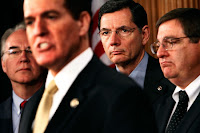
Democrat or Republican? Progressive or Conservative? Radical or Moderate?
I always grew up hearing the term Conservative Christian, yet was unsure of the terms meaning. Conservatism is the belief that traditional institutions work best and that society should avoid radical change. The root word is Latin and means, “to preserve”.
A religious conservative seeks to apply the teachings of particular ideologies to politics. Ideally for the Conservative Christian, this would be the ideology of Jesus Christ. It’s important to note there exists a distinction between religious conservatism and its more radical extension. Radical religious conservatism generally sees the status quo as corrupted by abuses, corruption, or heresy. Similar phenomena have arisen in a large percentage of the world's religions today. The modern Western society that has inadvertadly pushed it’s value system has triggered many violent cultural collisions with traditional societies in question for the past 500 years.
Sometimes religious conservatism (http://en.wikipedia.org/wiki/Conservatism#Religious_conservatism) may find itself at odds with today’s culture. This is often a good thing. However, not all firmly held beliefs should be maintained. For instance, some would have been called conservative Christians were against the freedom of slaves. For such people this was a Progressive act. Progressivism is often viewed in opposition to conservative. Progressivism is a political attitude favoring or advocating changes or reform. The Progressive movement began in cities with settlement workers and reformers who were interested in helping those facing harsh conditions at home and at work. The reformers spoke out about the need for laws regulating tenement housing and child labor. They also called for better working condition for women. Typically today the term is associated with left wing politics. “In the late 19th century into the 20th century in reference to a more general response to the vast changes brought by industrialization: an alternative to both the traditional conservative response to social and economic issues and to the various more radical streams of socialism and anarchism which opposed them.” (http://en.wikipedia.org/wiki/Progressivism)
I have hence learned that I too am a Conservative Christian in the sense that I seek a partial return to the way things were in the Body of Christ. In part, because I wish we had the social message and radical ideology, the unwavering faith and call to the broken that existed in the Way (early Christian Sect, not to be confused with current organization). I seek the action and reaction, the vibrancy and activity that existed in the early church. However, I don’t wish a return to the difficulties of roman persecution and lack of religious freedom, nor do I wish to reencounter the rampant heresy that existed.






